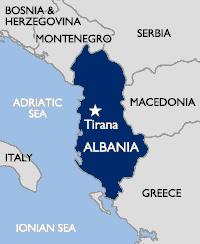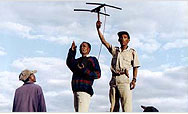Albania
USAID’s support of energy sector initiatives has facilitated environmentally friendly sustainable development in Albania. USAID and its partners and collaborators will assist Albania’s current and future efforts in mitigating the effects of climate change through energy sector privatization, increased energy efficiency, and promoting energy sector investment.
Background

Located in southeastern Europe in the west of the Balkan Peninsula, the Republic of Albania has spent the last decade making the transition from 46 years of communism to multi-party democracy and a liberal economic system. In recent years, Albania has achieved impressive economic growth, largely as a result of stable macro-economic policy, growing foreign remittances, and improved total factor productivity. Between 2003 to 2007, Albania experienced an average 5.5% annual growth in gross domestic product (GDP). Per capita income increased from $2,400 in 2004 to $3,150 in 2007. The national poverty rate was reduced significantly, from 25.5% in 2002 to 18.5% in 2005. While these accomplishments are impressive, Albania remains one of the poorest countries in Europe and its per capita income is among the lowest in the Balkan region. It has high unemployment, a widening trade deficit, and very low foreign direct investment. The investment environment remains unfavorable due to severe infrastructure deficiencies, weak governance and institutions, unresolved property issues, lack of a highly skilled work force, and a large informal economy. The lack of a reliable and adequate supply of energy is also a major constraint to Albania’s economic growth.
Sector-Specific Climate Change Activities
USAID supports Albania’s institutional development, policy and legal reforms, utility and regulatory technical assistance and partnerships for energy sector development. Because the Albanian power system relies on hydropower for more than 95% of its electricity generation, it depends greatly on rainfall. The lack of investments in new generation facilities, poor maintenance of existing facilities, and limited capacity of electricity imports have significantly reduced the country’s ability to supply its consumers. Weak institutional capacity to enable necessary energy sector reforms and attract foreign investment in the sector compound these problems. As a result, Albania continues to face serious energy crises that threaten the sustainability of its economic growth and inhibit its choices in developing clean energy alternatives. This unpredictable energy climate can have a devastating effect on the environment.
Distribution Privatization Support
USAID’s power sector assistance to Albania focuses on developing a sound privatization approach and an enabling legal, regulatory and market framework that will contribute to a functioning, regional, and competitive electricity market in Southeast Europe. Over the past few years, USAID has assisted in building the necessary regulatory and institutional structures, in particular by developing the Energy Regulatory Entity (ERE) into an effective and credible authority. The government now seeks a fast track privatization process, and USAID’s Distribution Privatization Support project will support this endeavor by pursuing the following three major objectives over a two year timeframe:
- To provide independent advice to the Albanian Government, especially the Ministry of Economy, Trade and Energy (METE), on the privatization of the electricity distribution function of the state utility, KESH.
- To establish a legal, regulatory, and market framework that will promote the privatization of electricity distribution by an experienced strategic investor who will be able to improve commercial operations and quality of service in the sector, and bring a commitment to invest in the modernization of the distribution infrastructure.
- To improve the transparency of the power sector and increase the capacity of the ERE to monitor effectively the electricity market and to oversee the new private distribution owner.
The privatization of the electricity distribution function will improve the efficiency of the power sector, reduce technical and commercial losses, promote efficient use and conservation of electricity, and encourage private investment in alternative energy sources.
Specific tasks will focus on increasing transparency, ensuring compliance with European Union (EU) directives, and instituting a tariff system that is fair, sustainable, and promotes increased energy efficiency.
These activities build upon past interventions. For example, energy efficiency has been a key aspect of USAID’s climate change mitigation approach. In preparation for the Albanian Energy Efficiency Law, USAID worked with Ministry of Industry and Energy and the National Energy Agency to develop environmentally sound energy policies and legislation. Along with the ERE, these entities also implemented steps to restructure and reform the power sector to place it on a financially self sustaining basis. Their efforts reduced hours of blackouts and use of stand-by diesel generator units countrywide (estimated to reach 70-80 MW) and associated carbon dioxide (CO2) emissions. Additionally, assisted by USAID, the ERE has approved regulations with respect to small power production (hydropower plants and combined heat power plants), the construction of which will also contribute to the reduction of CO2 emissions.
Similarly, USAID’s Balkan Electricity Market Partnership Program was designed to build capacity in Albania to meet the requirements of the Southeast Europe Energy Treaty. Albania’s entry into the competitive markets created by the Treaty will ultimately lead to efficiency improvements to both generation plants and transmission network performance, and decrease overall energy consumption, thereby reducing associated emissions.
Partners
USAID’s partners in climate change activities in Albania include:
- Advanced Engineering Associates International
- Albanian Electricity Regulatory Authority
- Albanian Ministry of Economy, Trade, and Energy (METE)
Because partners change as new activities arise, this list of partners is not comprehensive.
Back to Top ^
|


